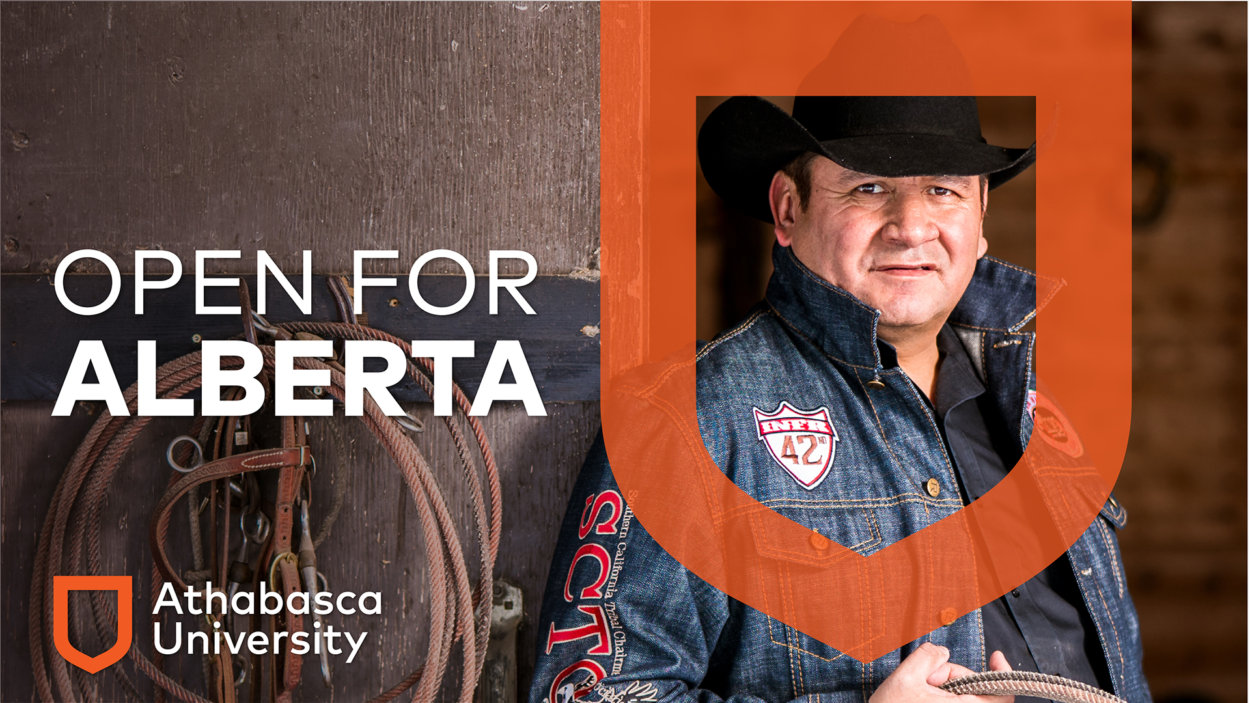AU a ‘perfect’ fit for Indigenous, remote communities, says grad

“Education can come to you,” says MBA grad Carter Yellowbird
Carter Yellowbird (Master of Business Administration ’12) isn’t afraid of taking chances. In fact, trying new things has proved a recipe for success in his life and career in business.
Yellowbird, of Samson Cree Nation, was just 16 years old when he left his home in Maskwacis for the first time for sunny California—an adventure that helped steer him toward his first career in professional rodeo. Years later, he moved halfway across the world to Paris to ride in Buffalo Bill’s Wild West Show at Euro Disney.
Both experiences were life-changing and helped him understand himself and his culture.
“Before I went to California, I wanted to get away. I said, ‘I’m moving away. I hate the community. I don’t want to be part of the community.’ What I didn’t realize is, wherever I run, there I am,” remembers Yellowbird, an Athabasca University (AU) business alum. “I was running away from myself.”
Take a chance on yourself
Today, Yellowbird is a business consultant who advises First Nations on how to diversify investment portfolios. He attributes his successes to that willingness to take chances, including with online learning at AU—Canada’s only open university.
Embracing the power of online learning is a message he often shares with young Indigenous People, especially those in remote communities thinking about enrolling in university. While Yellowbird followed opportunities that took him to other countries, he recognizes that’s not possible for everyone. The reality is, many people living on reserve do not have the ability or desire to leave home for a variety of reasons.
“It’s the fear of being out there, away from the reserve, which is challenging for a lot of people,” he says.
Athabasca University is perfect for First Nations and communities that are isolated, because education can come to you. Carter Yellowbird
Take a chance on yourself
Yellowbird says online at AU “is perfect” for people from First Nations and isolated communities, who aren’t able to attend a bricks-and-mortar university. “The education can come to you,” he says. AU’s open learning model also means anyone 16 years or older can pursue a degree.
Education is one of those opportunities that Yellowbird strongly believes can help counteract challenges closer to First Nations.
“Education is a key component that can help deal with challenges for many nations—unemployment, clean drinking water, and health, to name a few,” he says. “We need to incorporate unique innovative strategies to face challenges, and work closer with government and industry to assist First Nations with these challenges. We need to show them the doors and give them the tools and support to open the doors.”
Yellowbird believes economic development is the key element for wellness. “The people need to be given a chance to heal themselves through economic development,” he says. “Economic development creates goals and objectives, which is a form of wellness.”
Giving back to the community
Every year, AU awards $1,500 to an Indigenous student through the Carter Yellowbird Indigenous Bursary. Yellowbird says the bursary is meant to provide assistance to help students overcome challenges they may face.
“Hopefully it will help some other people, whether it helps with gas, helps with their tuition, food, whatever it takes. I just hope that it helps for a First Nations student to reach their goal.”
Open for Alberta
Read more profiles of AU learners and grads in our Open for Alberta series.